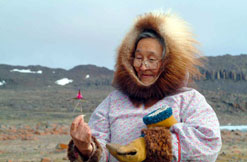page2
First-ever comprehensive inventory of Inuvialuit traditional plant knowledge in the Western Arctic
Interviewing and filming Inuvialuit Elders about their knowledge helps preserve ecological integrity in the Western Arctic
Among the Inuvialuit of the Western Arctic, knowledge about local plants and their uses has traditionally been passed from one generation to the next as part of oral tradition. Today, Inuvialuit Elders still possess much of the traditional knowledge about how to use plants for food, medicine and tools. However, due to the pressures of acculturation and other factors, that knowledge is not being passed to the next generation. As more of the key knowledge-holders pass away each year, the need to collect, preserve and present this unique information is urgent.
The Inuvialuit Ethnobotany Project addresses this need. Conducted over four years (from 2003 to 2006) and directed by a multi-stakeholder steering committee, the project is the first comprehensive inventory of traditional plant use among the Inuvialuit people. To date, over 40 Inuvialuit Elders from all six communities in the Inuvialuit Settlement Region have been interviewed. The interviews, as well as demonstrations of traditional plant use, have been captured on audio- and videotape. Plant specimens collected earlier in the project are preserved in herbaria across Canada. As well, work has begun on a professional, visually appealing book documenting the collected knowledge.
The project also aims to promote the wise use and conservation of plant resources within the Inuvialuit Settlement Region, which encompasses Ivvavik, Aulavik and Tuktut Nogait National Parks of Canada, as well as the Pingo Canadian Landmark. By collecting traditional Inuvialuit plant knowledge, preserving that knowledge and promoting education, the sharing of knowledge can continue.
 Two Inuvialuit Elders by a tree © Inuvialuit Cultural Resource Centre / B. Bandringa, 2003 |
Stakeholders from across the Inuvialuit Settlement Region have joined the project's steering committee, including representatives from Parks Canada (Western Arctic Field Unit), the Inuvialuit Cultural Resource Centre, the Aurora Research Institute (Government of the Northwest Territories), the Inuvialuit Game Council and local communities. Partners provide funding, as well as advice and recommendations, to ensure that project results are accurate, relevant and useful. Additional funding and in-kind support is provided by the University of Laval's Aboriginal Capacity and Developmental Research Environment (ACADRE) Program, the University of British Columbia and the Canadian Museum of Nature.
The Inuvialuit and their traditional culture are part of a healthy northern landscape. Many continue to live a traditional way of life, with close ties to the land. Through its collaborative approach, the Inuvialuit Ethnobotany Project preserves and shares that way of life. The unique information captured by the project helps maintain an important relationship between the Inuvialuit and their greater ecosystem. That ecosystem and tradition will both be enhanced by keeping the connections between the Inuvialuit, their living traditional culture, and their landscape strong.
Results
 Inuvialuit Elder holding a flower © Inuvialuit Cultural Resource Centre / B. Bandringa, 2004 |
- Over 40 Inuvialuit Elders from all six communities in the Inuvialuit Settlement Region have been interviewed by the project's ethnobotanist, both in their homes and on the land.
- Several hundred hours of recorded interviews and traditional plant use demonstrations have been stored on audio- and videotape. All interviews have been transcribed and verified.
- Roughly 3,500 photographs of traditional plants and their use have been archived.
- Almost 100 species, including algae, bryophytes, lichens and vascular plants have been collected as archival specimens.
- Collections are now preserved in herbaria across Canada including: the Aurora Research Institute, Inuvik, Northwest Territories; the University of British Columbia, Vancouver, British Columbia; the Canadian Museum of Nature, Ottawa, Ontario; and the Prince of Wales Northern Heritage Centre, Yellowknife, Northwest Territories.
- Date modified :